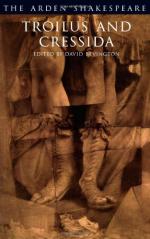|
This section contains 9,200 words (approx. 31 pages at 300 words per page) |

|
SOURCE: “Troilus and Cressida: The Worst of Both Worlds,” in Shakespeare Studies, Vol. 13, 1980, pp. 105-30.
In the following essay, Burns suggests that the play's negative portrayal of Cressida is in fact meant to reflect critically on those characters who condemn her and, more generally, to demonstrate the corrosive effects of war upon humanity.
One of the better-known scenes in Troilus and Cressida is IV,v, in which Cressida enters the Greek camp and is kissed in “particular” and “in general” (IV.v.20-21)1 by the leaders of the Greek army. Given Aristotle's dictum that all knowledge comes through either generals or particulars, these parameters of knowledge which Ulysses tries punningly to manipulate may be greatly significant in the play: certainly, readers often think that they “know” Cressida through this scene. More than Cressida's character alone enters into question here, however; when Ulysses obfuscates the difference between the “general...
|
This section contains 9,200 words (approx. 31 pages at 300 words per page) |

|


